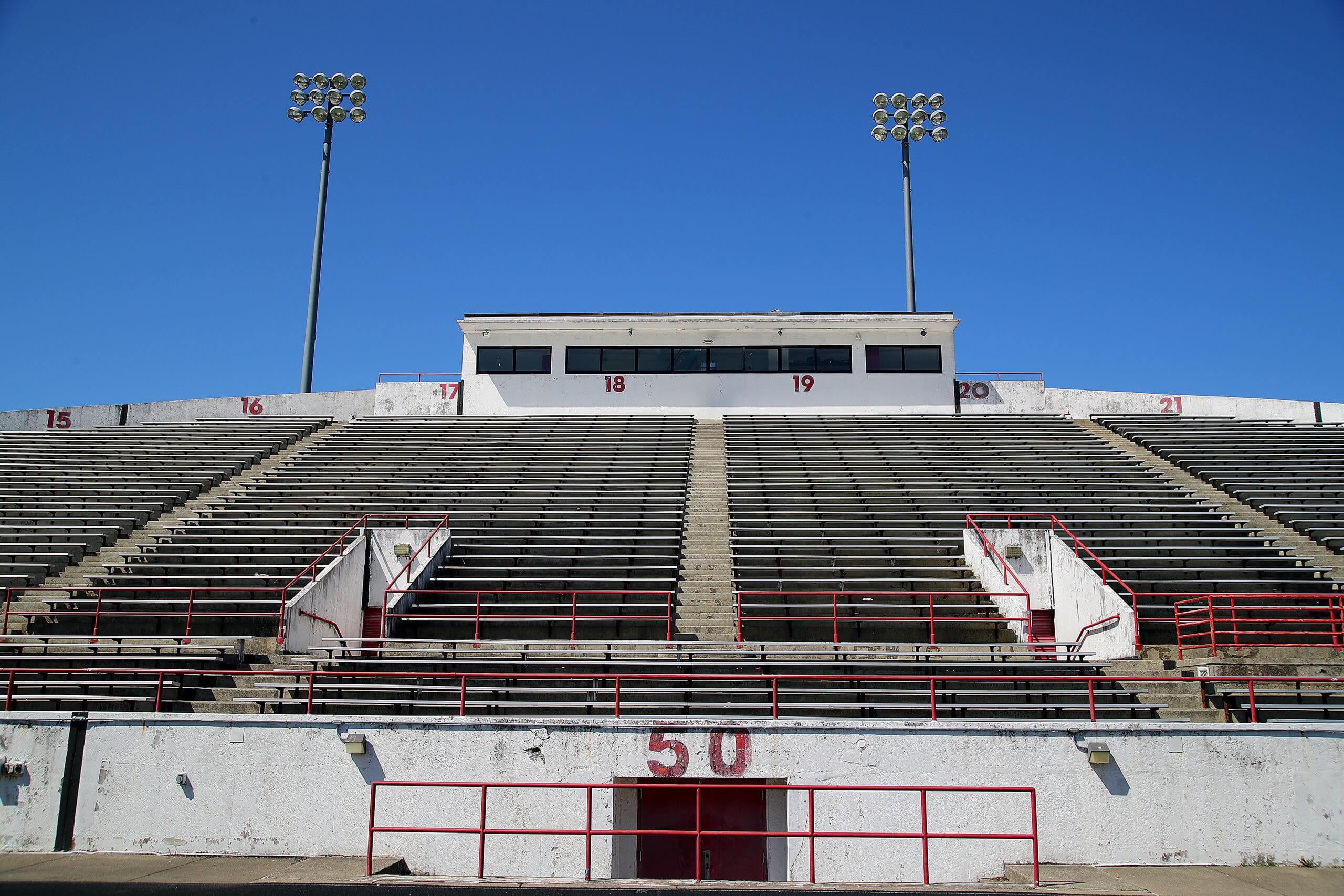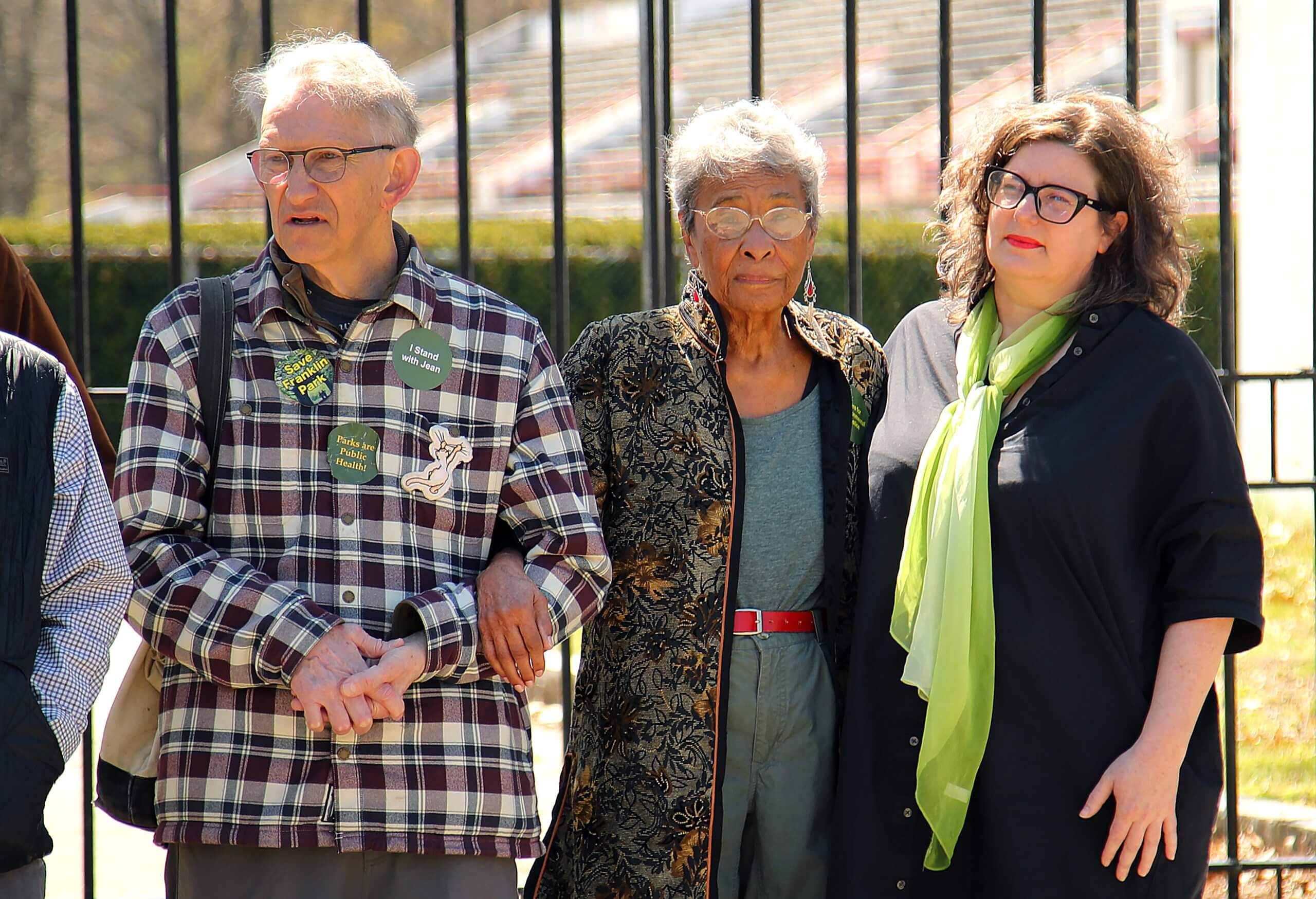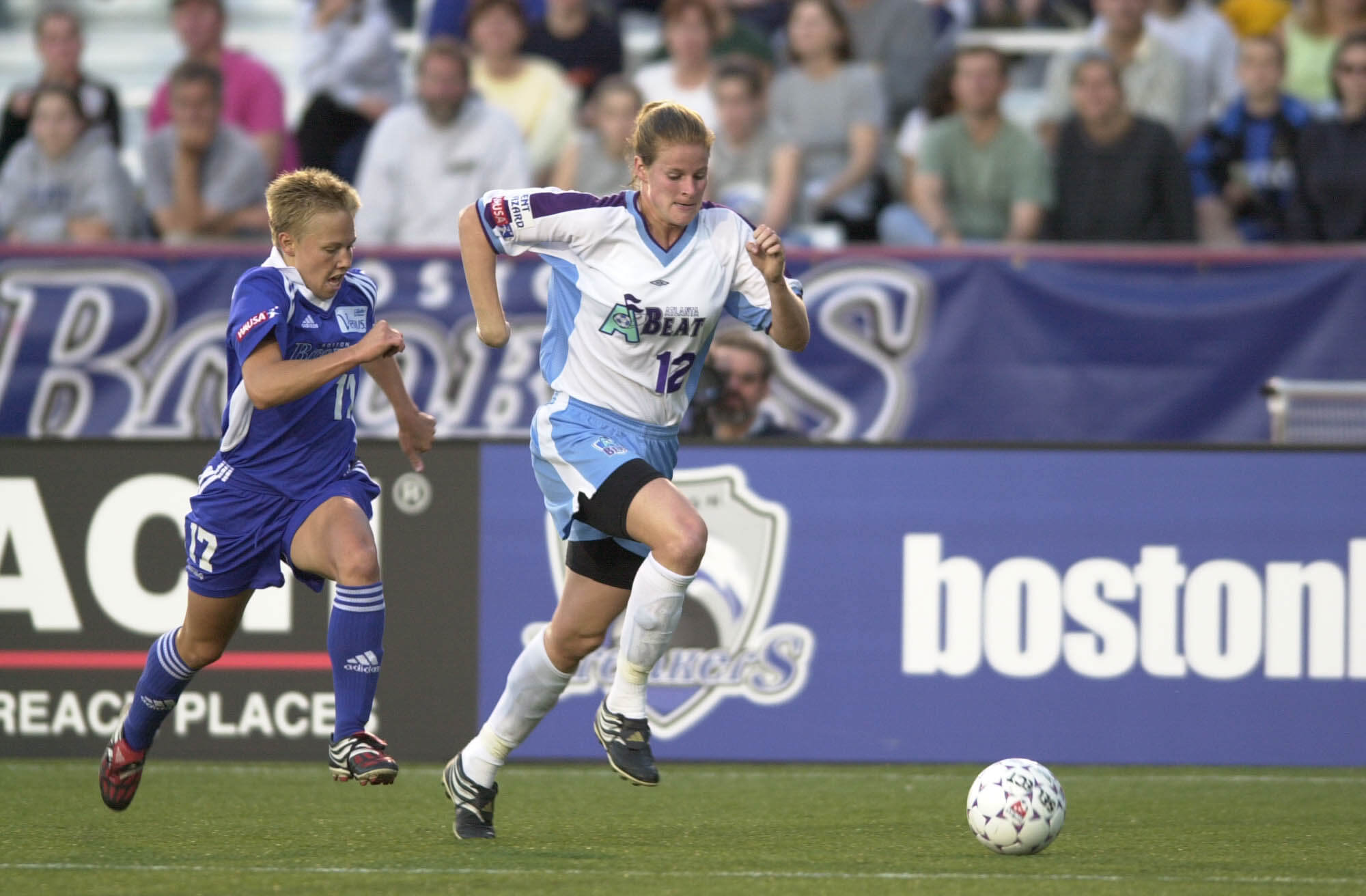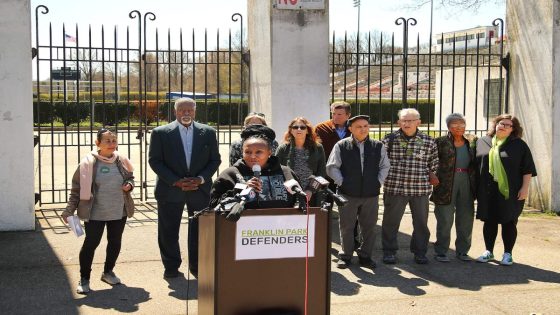Very little has come easy for the incoming Boston NWSL expansion team, set to start play in 2026. While the team made its first steps on the technical side, hiring Domènec Guasch from FC Barcelona as its first general manager and tasking him to build a team from scratch, Boston’s name and home stadium remain up in the air despite a year’s worth of work.
After the failed launch campaign for the team’s name and branding, revolving around “Too Many Balls,” there was no outright promise to rename the team. However, last month, BOS Nation FC wrote to its fans that the team “heard (their) feedback and are actively listening.”
While they have time to get their rebrand right, the Boston club’s journey to securing their home stadium for a 2026 start has only been made more difficult with deadlines looming and construction slated for January 2025. With funding costs rising for the team and the City of Boston, and an ongoing lawsuit from neighborhood advocates, the plans to renovate White Stadium have come into sharp relief over the past few weeks.
On Tuesday, a judge sided with residents in their quest to push back the discovery stage of their lawsuit against the City of Boston and BOS Nation FC ownership ahead of a March trial.
“Today we are more confident than ever that Franklin Park will be protected from their scheme to turn this historic parkland into a colossal sports and entertainment complex,” Renee Stacy Welsh, a member of the Franklin Park Defenders, said in the group’s press release Tuesday. “The question is: how much more money will Boston’s taxpayers funnel into this fatally flawed privatization plan before it collapses?”
Here’s where things stand for BOS Nation and its stadium.
Where will Boston play in 2026?
The plan remains for BOS Nation FC to play at a rehabilitated White Stadium in the Franklin Park area of Boston — but plans could change. The team was launched in September 2023 with the promise of public-private collaboration to modernize White Stadium, with Boston’s owners working hand-in-hand with the City of Boston. The NWSL team would lease the stadium from the city.
“I look forward to the revitalization of White Stadium and the partnership of this team and league to create new opportunities in Franklin Park and for our student-athletes citywide,” Boston’s mayor, Michelle Wu, said in the official release.
The stadium is owned by Boston Public Schools and despite falling into general dilapidation, is used for school football, soccer and track and field events, in addition to other community use. A fire damaged one side of the concourse and construction has not begun on the stadium.
Updated rendering for White Stadium from tonight’s design meeting w the city & @NWSLBoston
Both grandstands will have upper, middle, & lower levels. Private suites will be in the west grandstand’s middle level.
Design is still not final.#bospoli #NWSL #NWSLBoston pic.twitter.com/KhrwxhLUN2
— Jackie Contreras (@jackiedigital) May 31, 2024
What are the complications with the White Stadium plan?
Rising construction costs and a lawsuit opposing the plan for the public-private partnership between the city and the NWSL expansion team are two major issues the team faces.
First, the money. Public costs for the stadium were estimated at around $50 million when the stadium project was approved by the Boston Planning & Development Agency in July. Last month, Boston officials approved increased spending for stadium renovations — which has now ballooned to $91 million for city spending. The NWSL team has pledged to cover more than half of the project costs.
With the lawsuit, neighborhood advocates argue the city has pledged public land for private use with the NWSL deal. While the city owns White Stadium, it was built using funds from the George Robert White Fund (and named for the same man). The fund is a dedicated public charitable trust, and the stadium is built in a public park. The neighborhood advocates argue that the Boston NWSL deal violated Article 97 of the Massachusetts Constitution, known as the Public Lands Protection Act.
The advocates said there was no proper review of the stadium renovations under Article 97, and they also have concerns over continued school use of the stadium, as well as game-day use and transportation for the incoming NWSL team.

Who’s who in the ongoing lawsuit?
The plaintiffs include the Emerald Necklace Conservancy, a non-profit organization that serves as a steward for a series of parks throughout the Boston area, including the Franklin Park area. The group also includes several local citizens, and combined they are known as the “Franklin Park Defenders.”
The defendants include the City of Boston, the trustees of the George Robert White Fund (which was used to construct the stadium), and BOS Nation FC’s owner group, Boston Unity Soccer Partners (BUSP).
During a media availability Tuesday, controlling owner Jennifer Epstein joined new GM Guasch for questions from reporters. But when Epstein received the presser’s opening question on the evolving situation and increased costs with White Stadium, she asked for reporters to focus on Guasch’s hiring only. Epstein repeated this same request after a question on a potential name change.
“There’ll be more updates around those questions to come,” she said. “If you live in Boston, we can recognize that years of under-investment and neglect have left White Stadium in a state of decay and disrepair.”
Epstein reiterated that the club and city have planned to turn it into a “modern and accessible stadium… while restoring it as a treasured asset for the community.”
This plan, she said, “requires significant capital investment.”
When will a potential trial take place?
In June, the Massachusetts Superior Court opted to turn down both parties’ preferred timelines for discovery and a subsequent trial. Discovery closed on Dec. 6, with the trial currently scheduled to begin March 18, 2025.
On Nov. 15, Emerald Necklace Conservancy and the rest of the plaintiff group filed a motion to extend the timeline by six months. Their filing states that the defendants in the case, the City of Boston and Boston’s owner group, “conceded there is no prejudice whatsoever to extending the discovery period and the other deadlines set,” as a response to a line of questioning from the judge.
The City of Boston and Boston Unity Soccer Partners filed their own opposition motions to the proposed six-month delay.
The city’s rebuttal states that any delay “will imperil the White Stadium rehabilitation project and put its benefits at risk.”
BOS Nation FC made clear that the NWSL has the right to terminate the expansion’s team right to play if their home venue is not ready by “Spring 2026,” and the legal team also argues that construction and financing costs could increase because of a lengthy delay and could “render the project unworkable” for the city and/or the team’s owners, in addition to many sections arguing the plaintiffs could have been more efficient when it came to the timeline of discovery.
Boston’s owners say in their opposition filing that they have not yet produced two documents as they have not been finalized yet — the lease and stadium usage agreement — but will be shared once complete. They also proposed an extension of discovery to Feb. 6, without a change in the trial start date of March 18, “which will allow the plaintiffs more time to finalize their discovery assessments but will retain the certainty of the fixed trial date,” allowing the city and BOS Nation to move forward at their own risk with an ongoing trial.
On Tuesday, Judge Julie Green agreed for both sides to find a new deadline for the discovery stage, though the trial date is still set for March 18. The neighborhood advocates viewed this as a victory after headlines of rising public costs for the stadium.
“The public still hasn’t seen the lease between the city and soccer investors, or a realistic transportation plan to accommodate 11,000 soccer fans at a transit-starved location with no parking,” Melissa Hamel, a member of the Franklin Park Defenders said in the group’s press release. “This decision is a victory for every member of the public who deserves to see what else the proponents of this absurd plan are hiding. We just hope there’s time to reconsider the loss of 145 trees and several acres of public parkland.”

Why did the local citizens and conservancy groups ask for a delay?
In the November filing, the conservancy group’s legal team argued that the city and the team had produced nearly 60,000 pages of documents by Oct. 30, which did not provide enough time “to analyze those documents, and prepare follow up discovery requests, and take appropriate depositions.”
In addition to the logistical arguments, the legal team also said BUSP has withheld information about the team’s communication and agreements with the NWSL, and that the team had filed a motion for a protective order to prevent the plaintiffs from reviewing this information. The filing says that the evidence that had been produced by mid-November shows that before the city issued any proposal for the use or lease of White Stadium, “Epstein, who later founded BUSP, was negotiating directly with NWSL for the Boston franchise and enlisting City of Boston personnel in that effort as it pertains to NWSL’s questions about the use of White Stadium in Franklin Park.”
The filing states that the plaintiffs “intend to subpoena NWSL directly for documents (and possibly conduct a deposition of a corporate representative),” which will also take additional time as the NWSL is headquartered in New York City.
The Athletic asked the league on Tuesday if they had received a subpoena, but the NWSL has not replied to the request for comment.
What’s the response from the city and BOS Nation?
Beyond critiquing how the plaintiffs have used their time over the past few months, the city’s filing also notes that the plaintiff’s document requests for communications between BUSP and the NWSL included some that are “confidential and irrelevant to the issues in this case,” hence the protective order requested in October.
The team provided five reasons to not extend the timeline in its filing: they have completed all permitting from four different agencies, the NWSL requires the stadium to be operational by Spring 2026, the team and city have already proceeded at risk (in their words: “invested and incurred expenses in the millions of dollars toward realization of this project”), they must sign contracts for construction and materials immediately, and the team “will complete all current pending discovery on a timely basis consistent with the most current deadline extension.”
According to the team, they are “on the brink of receiving final sign-offs to enable demolition and construction to begin immediately.” Any trial extension puts their timeline at risk.
Based on the team’s technical proposal from 2023, construction was planned to begin in January 2025 and last for the entire year.

Where else could Boston play?
According to The Boston Globe, BOS Nation has considered Nickerson Field at Boston University as its backup plan since 2022. The stadium has a capacity of 9,871. It has a turf surface but FIFA has certified the stadium for professional and international play.
While Nickerson Field is more than 100 years old, it is also far more accessible via public transportation than White Stadium. It also served as the home venue for the first version of the Boston Breakers during the WUSA years, so it has a historical women’s soccer connection as well.
The team does not appear to have considered Gillette Stadium, home of the New England Revolution and the Patriots, as a potential alternate. The stadium’s location and massive capacity (and turf surface) would make it a poor fit for a new expansion team. The Revs’ long-awaited soccer-specific stadium has also made progress this fall. The timeline for that proposed stadium is considerably more vague than Boston’s plan for White Stadium, though.
Neither the NWSL nor a spokesperson for BOS Nation FC replied to requests for comment on Tuesday.
Could NWSL push back expansion to 2027?
While construction is not yet behind schedule, the NWSL also hasn’t announced the second team joining Boston as an expansion side for the 2026 season. While Epstein and the rest of the owner group have continued to express concerns during the legal proceedings that the NWSL can pull their rights to play in the league, there is another solution if the lawsuit drags on and delays the league’s timeline.
Even if the lawsuit wraps in Boston’s favor and they’ve begun construction at risk, this might not be the worst idea. Whichever market joins the league — between the three finalists of Denver, Cleveland and Cincinnati — has a much shorter runway than Boston. There’s also the matter of the United States co-hosting the 2026 men’s World Cup, which won’t just be pulling eyeballs and attendance figures away from the NWSL, but also poses a significant logistical challenge for the league as they lose access to venues that summer. The Athletic asked the NWSL if it would consider this option, but has yet to receive a reply.
While the NWSL could view the men’s tournament as a chance to capture general soccer fans — especially with MLS confirming they will not play through the summer World Cup dates on home soil — balancing that mission while launching two expansion teams without their own dedicated facilities is a massive ask.
(Top photo: John Tlumacki / The Boston Globe via Getty Images)





